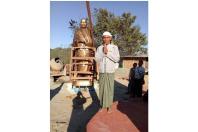(Daily Star/ANN) — Mansura Hossain, a journalist for over 15 years, frequently travels to various parts of Dhaka on assignments and for interviews. She does not like crowded buses dominated by male passengers.
“Over the years, I mostly used CNGs [CNG-run autorickshaws], though it was not easy to get one. Sometimes, it took half an hour to find one … and often haggling with them over fare was upsetting,” she said.
Things radically changed over the last few years due to ridesharing apps like Uber, Pathao and Obhai.
“I go to work, on assignments or visit relatives using rideshare. It's a lot easier, safer, and time-saving. This is a revolutionary change,” said Mansura, a resident of Shekhertek of Mohammadpur.
Sharing an example, Mansura said she recently went to the Hazrat Shahjalal International Airport to cover an event and had to be there until midnight, but she did not worry at all as she knew she could get an Uber or Pathao ride.
This change comes as city dwellers continue to endure traffic jams. Congestion, according to the World Bank, eats up 3.2 million working hours per day in Dhaka and average traffic speed has dropped from 21 kmph to 7kmph in the last 10 years.
Taxis and four-stroke autorickshaws, introduced in 2003, failed to provide satisfactory services. The government had set fares for the taxis and the autorickshaws on several occasions but the drivers hardly ever went on trips on the metre. They often refused to go to certain places as well.
With the advent of ridesharing companies in developed countries, Bangladeshi company Pathao initiated a similar venture in Dhaka in 2015. Next year, US company Uber began its journey here. Obhai, Obon, Lily and Shohoz followed. Obon and Lily are run exclusively by women.
Some ridesharing companies also allowed autorickshaws to operate. Shohoz and Pathao also function as courier services for e-commerce companies.
According to Bangladesh Road Transport Authority (BRTA), there are 24 ridesharing companies giving relief to thousands of city dwellers.
As of November 2017, an estimated 500,000 commuters opted to hail rides via apps, according to a business review of IDLC Finance Ltd published in June 2018.
Prof Moazzem Hossain, a transportation and traffic engineering expert from Bangladesh University of Engineering and Technology (Buet), said the app-based ridesharing is a very efficient and accessible means of transport. Drivers and passengers can save a lot of time, he said.
“The vehicles don't need to park. The passengers can find the nearest vehicle in a short time. This is win-win for both parties,” he said.
The occupancy rate of the vehicles goes up, he told The Daily Star.
Such services also created thousands of jobs.
Saiful Islam, 21, needed a job to fund his studies but the marketing executive job he got in early 2018 took him to Keraniganj even though he needed to be in Dhaka for his studies.
“I quit the job and bought a bicycle and started working for Pathao food delivery service. I have an income of around Tk 10,000 a month. It is helping me stay in Dhaka and study,” he said.
CHALLENGES
While the ridesharing companies have great positive impacts, there are some challenges too. One of them, experts said, is poor driving skills.
“This raises the risks of accidents,” said Prof Moazzem. He suggested a government regulatory mechanism to ensure that the drivers were competent.
Prof Mizanur Rahman, director at the Accident Research Institute at Buet, said a large number of motorbikes of the ridesharing companies and often their arbitrary driving were factors in the higher accident rates.
Motorbike sales in 2017 more than doubled to 3.60 lakh from 1.43
lakh in 2015, according to the review of IDLC, a non-banking financial institution.
Prof Mizanur said many of the drivers were new and did not know much about the capital's streets.
He also said the app-based services were expensive and were not accessible to all. The BRTA could deploy experts to make calculations and set a reasonable fare, he said.
Mansura said some drivers' attitude towards female passengers was not decent, something the ridesharing companies need to look into.
Banker Abida Sultana, a frequent user, said some male drivers behave in such a way as if the female passengers were their relatives.
“Companies should train them properly,” she said.
Mansura said apps of some companies were not user-friendly, especially in the provisions for filing complaint. This has to be improved, she said.
Prof Mizanur said while ridesharing companies are helpful, the government focus should be improving public transport system, which is accessible to all.
https://www.thedailystar.net/backpage/ride-sharing-apps-brings-comport-t...










